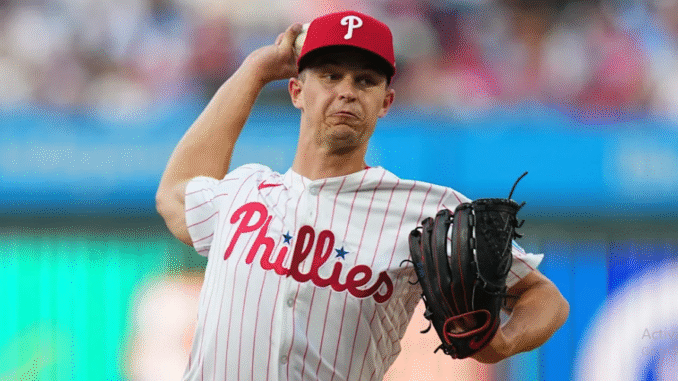
In what was expected to be a critical series for the Philadelphia Phillies, everything that could go wrong did go wrong against the New York Mets — and it all started with the highly anticipated call-up of pitching prospect Mick Abel.
The Phillies had high hopes for Abel, their No. 2 overall prospect, to provide a spark and stabilize a rotation struggling with fatigue and inconsistency. But instead of delivering the breakout perform
All eyes were on Abel, a 22-year-old right-hander known for his electric fastball and poise on the mound. But from the first pitch, it was clear nerves had the better of him. Abel struggled with command, walking three batters in the first inning alone and allowing five earned runs before he was pulled early. His fastball velocity dipped, and his breaking pitches lacked the usual bite.
While one poor start doesn’t define a career, the Phillies’ decision to thrust him into such a high-pressure situation raised eyebrows. The debut was supposed to be a statement — instead, it was a warning sign.
Beyond Abel’s performance, the Phillies’ offense was alarmingly quiet throughout the series. Key hitters like Bryce Harper and Kyle Schwarber went ice cold, combining for just 2 hits across multiple games. The team left an astonishing number of runners in scoring position, failing to capitalize on the few chances they had.
The Mets’ pitchers, led by a surprisingly sharp José Quintana, dominated the plate and exposed the Phillies’ overreliance on power hitting without consistent contact or smart base-running.
Even when the Phillies had a glimmer of hope, sloppy defense extinguished it. Two critical errors in Game 2 — one by shortstop Trea Turner and another by third baseman Alec Bohm — allowed the Mets to pile on extra runs and crush the Phillies’ morale.
The defense, which had shown improvement earlier in the season, reverted to last year’s bad habits, with miscommunication, poor throws, and mental lapses all contributing to the collapse
The bullpen, already stretched thin after a tough stretch of games, looked utterly gassed. Relievers like Gregory Soto and Seranthony Domínguez failed to hold leads or even keep games close. Manager Rob Thomson’s decision-making also came under fire, with questionable timing in pulling pitchers and relying too heavily on tired arms.
The lack of bullpen depth — especially after the overuse earlier in the season — reared its ugly head when the team needed them most.
This disastrous showing against the Mets didn’t just affect morale — it has serious implications in the National League East standings. The Braves widened their lead, and the Mets, previously seen as a non-factor, gained valuable ground and confidence.
The series exposed a Phillies team that’s dangerously vulnerable in key areas: pitching depth, consistency at the plate, and resilience under pressure.
The front office has decisions to make — and fast. Mick Abel still has a bright future, but he may need more time in the minors to develop. The team may be forced to seek pitching reinforcements before the trade deadline. Offensively, a shake-up might be necessary to reignite the lineup.
For now, Phillies fans are left with more questions than answers — and a sobering reminder that one bad series can change everything.
One thing is certain: the Phillies need to regroup — and they need to do it quickly — before the season starts slipping away

Leave a Reply